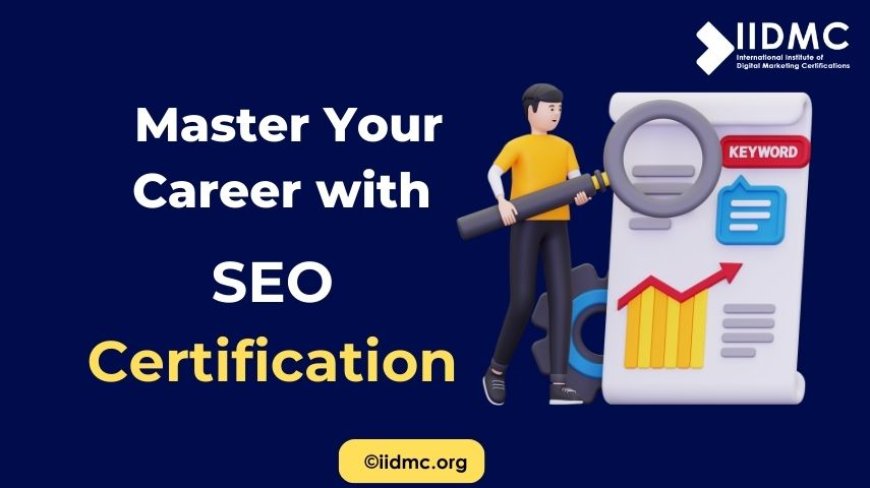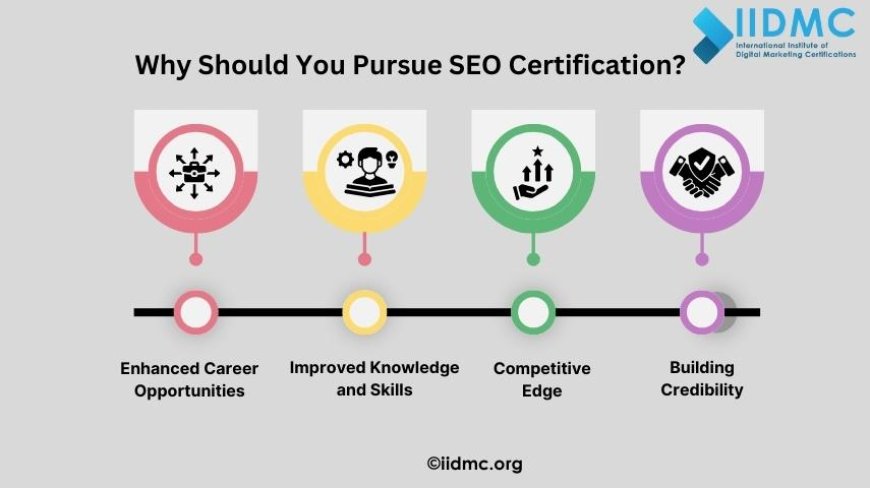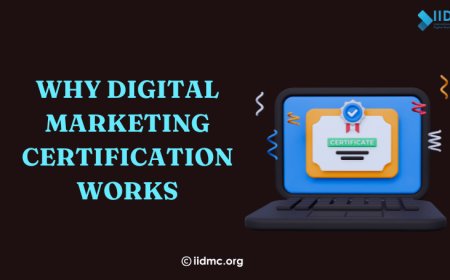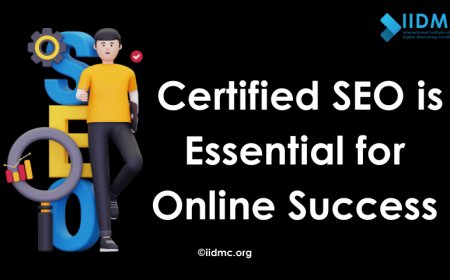Step-by-Step Guide to SEO Certification
A step-by-step guide to SEO certification, covering essential skills, courses, and strategies to enhance your website ranking and drive organic traffic.

The journey to earning my SEO certification changed everything for me. With my background in digital marketing, I knew how vital SEO was for bringing in organic traffic. Pursuing the certification allowed me to learn in a structured way and gain a deeper insight into SEO strategies. The knowledge I acquired not only sharpened my professional abilities but also greatly improved the websites I managed. One of the most important things I learned was how to conduct keyword research and build links. These skills helped me boost organic traffic by 150% for a project in just six months. The combination of organized learning and real-life application made the certification process incredibly rewarding.
Being skilled in Search Engine Optimization (SEO) is essential for improving your online visibility. Getting an SEO certification not only confirms your skills but also creates many job opportunities for you. This guide will take you through the steps to earn your certification, helping you get ready to succeed in this ever-changing industry. Whether you’re a veteran marketer or a beginner, this certification will give you the important tools and strategies to remain competitive. With the rising demand for SEO professionals, it’s the perfect time to invest in your personal growth and abilities.
What is SEO certification?
SEO certification is a formal acknowledgment of your proficiency in SEO principles and practices. It demonstrates your ability to optimize websites to achieve higher search engine rankings, thereby increasing visibility and traffic. Certification programs are typically offered by established organizations or educational institutions, focusing on various aspects of SEO such as:
On-Page Optimization
On-page optimization involves refining individual web pages to rank higher and earn more relevant traffic. This includes optimizing titles, meta descriptions, and headers, and ensuring the content aligns with targeted keywords.
Technical SEO
Technical SEO focuses on the backend of a website, ensuring it meets search engine requirements. It involves improving site speed, ensuring mobile friendliness, fixing broken links, and enhancing site structure.
Link-Building Strategies
Link-building is about acquiring high-quality backlinks from other websites to boost your site's authority. This can be achieved through guest posting, partnerships, or creating shareable, valuable content.
Content Marketing
Content marketing emphasizes creating high-quality, engaging, and relevant content to attract and retain an audience. This strategy integrates keyword optimization to ensure the content aligns with SEO goals.
SEO Analytics and Performance Tracking
SEO analytics involves using tools to monitor and measure website performance, such as traffic and keyword rankings. This data helps refine strategies and ensure continuous improvement in search engine visibility.
Why Should You Pursue SEO Certification?
Pursuing SEO certification validates your expertise, making you a more attractive candidate for employers while enhancing your skills in driving organic traffic. It provides structured learning and credibility, helping you stay competitive in the dynamic digital marketing field.
Investing in a certification provides tangible and intangible benefits. Here are some compelling reasons to pursue it:
-
Enhanced Career Opportunities
Many companies prioritize hiring certified professionals for SEO-related roles, as it reflects validated expertise. -
Improved Knowledge and Skills
A certification program offers structured learning, helping you master the nuances of SEO that are often overlooked in self-study. -
Competitive Edge
With certification, you stand out among peers, showcasing your commitment to professional growth and excellence in SEO. -
Building Credibility
Whether you’re a freelancer or part of an organization, a certification can help build trust with clients and stakeholders.

How to Choose the Right SEO Certification
Choose an SEO certification from reputable organizations like IIDMC that aligns with your career goals, covers comprehensive SEO topics, and fits your schedule. Ensure it's industry-recognized and provides practical learning opportunities.
Here are factors to consider when selecting the right certification program:
-
Reputation and Credibility
Choose programs from reputable organizations like IABAC. -
Curriculum Depth
Ensure the program covers both foundational and advanced SEO strategies, including technical optimization and analytics. -
Cost and Accessibility
Compare costs and check whether the program offers flexible learning schedules to suit your availability. -
Industry Recognition
Opt for certifications recognized by employers, ensuring your credentials carry weight in the job market.
Steps to Achieve SEO Certification
Steps to Achieve SEO Certification outlines the essential actions required to successfully obtain a certification. It includes researching programs, mastering foundational concepts, applying practical techniques, and preparing for the certification exam. This structured approach ensures readiness and maximizes the benefits of certification.
1. Research and Select the Program
Begin by identifying certification programs aligned with your goals. Consider the scope, duration, and credibility of each.
2. Understand the Prerequisites
Some programs may require foundational knowledge of SEO or digital marketing. Familiarize yourself with the basics before enrolling.
3. Enroll and Start Learning
Once you’ve selected a program, enroll and commit to the coursework. Many programs are self-paced, allowing you to learn at your convenience.
4. Apply Concepts Practically
SEO is best learned through practice. Create test websites, run SEO experiments, and analyze results to reinforce your learning.
5. Take Practice Tests
Many certification providers offer practice exams. Use these to familiarize yourself with the exam structure and identify knowledge gaps.
6. Schedule and Take the Certification Exam
When you feel confident, schedule your exam. Ensure you review all course materials and clarify any doubts before the test day.
What to Expect in an SEO Certification Exam
Certification exams generally test a range of skills, including:
-
Understanding search engine algorithms
-
Conducting keyword research
-
Performing technical SEO audits
-
Analyzing data using tools like Google Analytics
Most exams include multiple-choice questions, case studies, and sometimes practical assessments. Passing criteria vary, so ensure you meet the minimum score requirement.
How to Leverage Your SEO Certification
steps to maximize the value of your certification by updating your professional profiles, showcasing real-world projects, and networking within the Search Engine Optimization community. It emphasizes using your credentials to enhance career opportunities, attract clients, and build credibility. This approach ensures your certification translates into tangible professional success.
Once you’ve obtained your SEO certification, here’s how to maximize its value:
-
Update Your Resume and LinkedIn
Highlight your certification to demonstrate your expertise to potential employers or clients. -
Showcase Your Skills
Create a portfolio of SEO projects where you’ve applied your skills. This builds credibility and trust. -
Network in the SEO Community
Join forums, webinars, or SEO conferences to connect with other professionals and stay updated on trends. -
Start Freelancing or Consulting
If you're inclined toward entrepreneurship, your certification can attract clients seeking SEO expertise.
Challenges to Keep in Mind
While obtaining SEO certification is valuable, success in this field also relies on:
-
Continuous Learning
SEO changes constantly. Stay updated on algorithm changes, new tools, and industry trends. -
Practical Application
Certification provides a foundation, but consistent practice is crucial for mastering SEO techniques. -
Building a Portfolio
Employers and clients value proven results. Showcase projects where your SEO strategies have delivered measurable outcomes.
Top Tips for Success in SEO
It helps professionals optimize websites effectively, drive organic traffic, and achieve higher search engine rankings. The focus is on mastering analytics, user intent, and technical SEO while staying updated with growing trends. These strategies ensure sustainable growth in the dynamic digital landscape.
-
Stay Analytical
Use tools like Google Analytics, SEMRush, or Ahrefs to measure your strategies' effectiveness. -
Focus on User Intent
Always prioritize content that answers user queries and provides value. -
Master Technical SEO
Understand website structure, speed optimization, and mobile responsiveness to excel in technical SEO. -
Optimize for Local Search
With the rise of “near me” searches, local SEO is more critical than ever.
Achieving SEO certification is a valuable investment in your professional development. It equips you with the knowledge and credentials to excel in the competitive digital marketing environment. By following this step-by-step guide, you can navigate the certification process with confidence and set the stage for a successful career in SEO.
SEO certification is not just a credential; it is a pathway to mastering a skill that is critical for businesses in today’s digital age. Whether you’re just starting or looking to enhance your expertise, certification is a solid step forward. It empowers you to implement effective strategies that drive organic growth and measurable results. With the right certification, such as those offered by IIDMC, you position yourself as a trusted expert in the ever-growing world of SEO.





























